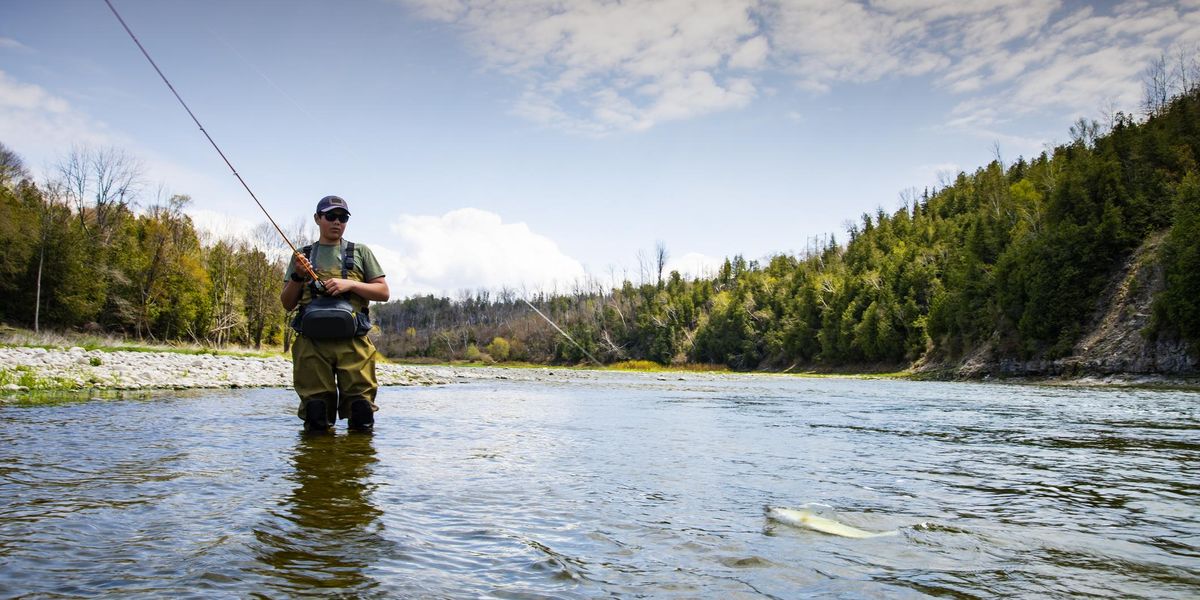
Yet another study on Tuesday raised the alarm about the dangers of "forever chemicals," revealing that eating just one locally caught freshwater fish in the continental United States can be equivalent to drinking contaminated water for a month.
Per- and polyfluoroalkyl substances (PFAS) are widely called forever chemicals because they persist in the human body and environment for long periods. Despite public health concerns, the manufactured chemicals have been used in products ranging from firefighting foam and waterproof clothing to nonstick pans and food packaging.
"These test results are breathtaking."
Duke University and the Environmental Working Group (EWG) researchers analyzed data for over 500 fish fillet samples collected across the country from 2013-15 for a pair of U.S. Environmental Protection Agency (EPA) monitoring programs: the National Rivers and Streams Assessment and the Great Lakes Human Health Fish Fillet Tissue Study.
"Identifying sources of PFAS exposure is an urgent public health priority," said study co-author and EWG senior scientist Tasha Stoiber in a statement.
"PFAS contaminate fish across the U.S., with higher levels in the Great Lakes and fish caught in urban areas," she noted. "PFAS do not disappear when products are thrown or flushed away. Our research shows that the most common disposal methods may end up leading to further environmental pollution."
Perfluorooctanesulfonic acid (PFOS) contributed significantly to the high levels in the samples. U.S. manufacturers have largely phased out that PFAS, but it has been used in firefighting foam and was a main component of Scotchgard, a fabric protector by 3M—which announced last month that it plans to exit the PFAS market by the end of 2025.
As the new study states:
The two datasets indicate that an individual's consumption of freshwater fish is potentially a significant source of exposure to perfluorinated compounds. The median level of total targeted PFAS in fish fillets from rivers and streams across the United States was 9,500 ng/kg, with a median level of 11,800 ng/kg in the Great Lakes. PFOS was the largest contributor to total PFAS levels, averaging 74% of the total.
"These test results are breathtaking," said Scott Faber, EWG's senior vice president for government affairs. "Eating one bass is equivalent to drinking PFOS-tainted water for a month."
Specifically, the researchers calculated that eating one 8 oz. serving of fish is equivalent to consuming one month of drinking water with PFOS at 48 parts per trillion (ppt), which is 2,400 times the interim U.S. EPA health advisory.
"People who consume freshwater fish, especially those who catch and eat fish regularly, are at risk of alarming levels of PFAS in their bodies," said co-author and EWG senior scientist David Andrews. "Growing up, I went fishing every week and ate those fish. But now when I see fish, all I think about is PFAS contamination."
The study stresses that "the exposure to chemical pollutants in freshwater fish across the United States is a case of environmental injustice that especially affects communities that depend on fishing for sustenance and for traditional cultural practices."
While the study was published in the journal Environmental Research, EWG's website features an interactive map that details the key findings nationwide.
The researchers found that the median levels of total PFAS in freshwater fish were 278 times higher than those in commercial fish tested by the U.S. Food and Drug Administration from 2019-22.
"It's incredible how different they are," Andrews toldThe Hill. According to the outlet:
Some commercially caught fish may be less contaminated because they are grown in controlled aquaculture environments, Andrews explained. Meanwhile, large-scale ocean fishing often occurs farther offshore, where PFAS pollution would be more diluted, he added.Andrews acknowledged, however, that the data on commercially caught fish is much more recent than the freshwater contamination figures.
He also recognized that with the industrial phaseout of PFOS production, the pollution "levels in rivers and streams do seem to be decreasing, which is important."
"At the same time, the levels are still so high that any fish consumption likely impacts [human blood] serum levels," Andrews said. "But they are moving in the right direction, which I think is some good news, at least in terms of the rivers and streams."
Despite some progress—including smallsteps last year by the EPA—the researchers and others pointed to the findings as evidence of the need for further action on PFAS.
"The extent that PFAS has contaminated fish is staggering," said lead researcher Nadia Barbo, a graduate student at Duke. "There should be a single health protective fish consumption advisory for freshwater fish across the country."
EWG's Faber declared that "for decades, polluters have dumped as much PFAS as they wanted into our rivers, streams, lakes, and bays with impunity. We must turn off the tap of PFAS pollution from industrial discharges, which affect more and more Americans every day."
"The EPA needs to move swiftly to set regulations for the industries most likely to be dumping PFAS into the environment," he added. "Downstream communities especially have suffered the consequences of unregulated PFAS discharges for far too long."
This content originally appeared on Common Dreams and was authored by Jessica Corbett.
Jessica Corbett | Radio Free (2023-01-17T20:06:51+00:00) Eating One Freshwater Fish Equals a Month of Drinking Water With ‘Forever Chemicals’: Study. Retrieved from https://www.radiofree.org/2023/01/17/eating-one-freshwater-fish-equals-a-month-of-drinking-water-with-forever-chemicals-study/
Please log in to upload a file.
There are no updates yet.
Click the Upload button above to add an update.